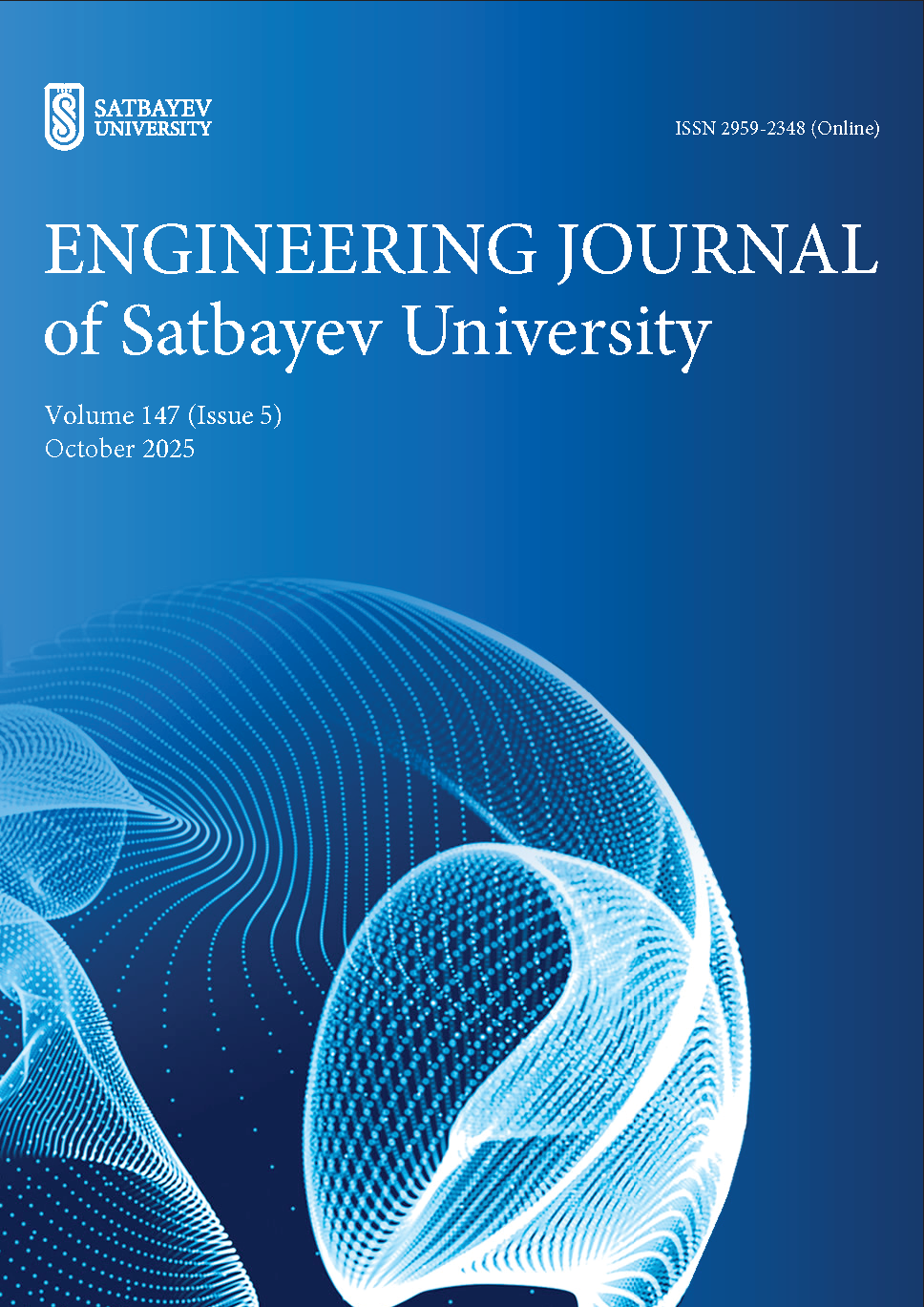Жер асты қабаттарында тасқын суларын жинау арқылы Қазақстанның су бюджетін оңтайландыру
##plugins.pubIds.doi.readerDisplayName##:
https://doi.org/10.51301/ejsu.2025.i5.04Ключевые слова:
басқарылатын су өткізгіш қабаттарды қайта толтыру, экономикалық тиімділік, су жабдықтау, климат өзгерісі, су ресурстары, тұрақты дамуАннотация
Зерттеу климаттың өзгеруі мен су тапшылығы жағдайында тұрақты сумен жабдықтау әдісі ретінде басқарылатын Сулы горизонтты толықтыру жүйелерінің (managed Aquifer Recharge, MAR) экономикалық тиімділігін талдауға бағытталған. Жұмыста MAR негізгі принциптері, оның сумен жабдықтау шығындарын азайтудағы, су шығынын азайтудағы, экстремалды климаттық жағдайларға төзімділікті арттырудағы және экожүйелердің тепе-теңдігін сақтаудағы артықшылықтары қарастырылады. MAR қолдану ауыл шаруашылығы мен жергілікті қауымдастықтарға бере алатын экономикалық және әлеуметтік артықшылықтарға ерекше назар аударылады. Зерттеу әдістемесі қолданыстағы тәжірибені талдауды, экономикалық модельдеуді және аймақтық деңгейде MAR технологиясын енгізудің әсерін бағалауды қамтиды. Нәтижелер MAR су ресурстарын тұрақты пайдалануға және өмір сүру сапасын жақсартуға ықпал ететін тиімді және үнемді су стратегиясы екенін көрсетеді. Ғылыми жаңалық-климаттың өзгеруі жағдайында MAR жүйелерін қолданудың экономикалық орындылығын негіздеу, ал зерттеудің практикалық маңыздылығы - алынған нәтижелерді су ресурстарын басқару тәжірибесіне енгізу мүмкіндігінде жатыр.
Библиографические ссылки
Wu, Y. & Shen, Y. (2021). Simulation of climate change impacts on groundwater recharge in an arid region using SWAT and MODFLOW. Hydrological Sciences Journal, 66(1), 1-13. https://doi.org/10.1080/02626667.2020.1852247
Sallwey, P., Schröder, L. & McDonald, C. (2024). Assess-ment of managed aquifer recharge in semi-arid regions under climate change using integrated modeling. Hydrogeology Journal, 32(3), 651–664. https://doi.org/10.1007/s10040-024-02456-w
Makyzhanova, D., Yessekin, B., Tulegenova, G. & Issanova, G. (2023). Assessment of water management challenges in arid Central Asia: A case study of Kazakhstan. Water, 15(5), 874. https://doi.org/10.3390/w15050874
Schleiss, A.J., De Cesare, G. & Hermann, F. (2016). Hydro-power production and sediment management. Hydraulic En-gineering and Sustainable Infrastructure, CRC Press
Zhao, Q., Wang, W., Wang, D. & Chen, X. (2019). Urban stormwater management based on sponge city construction: A case study of Changzhou, China. Water, 11(4), 767. https://doi.org/10.3390/w11040767
Akhmetshin, E.M., & Kovalenko, K.E. (2019). Innovation in environmental management in Kazakhstan: Barriers and op-portunities. Entrepreneurship and Sustainability Issues, 7(1), 659-671. https://doi.org/10.9770/jesi.2019.7.1(47)
Zare, F. & Kalantari, Z. (2018). Flood resilience in urban areas: A review of the role of green infrastructure. Sustaina-bility, 10(11), 3913. https://doi.org/10.3390/su10113913
Sallwey, J., Thompson, J. & McVicar, T. (2019). Hydrogeo-logical performance and sustainability of MAR systems: Long-term evaluation from Australia. Water, 11(1), 98. https://doi.org/10.3390/w11010098
Dillon, P., Pavelic, P., Page, D., Beringen, H. & Ward, J. (2019). Managed aquifer recharge in Australia: History, cur-rent status and future prospects. Water, 11(1), 46. https://doi.org/10.3390/w11010046
Adar, E.M., Nativ, R. & Mandel, A.D. (2012). Wastewater reuse and aquifer recharge: Economic, regulatory and envi-ronmental perspectives from Israel. Environmental Earth Sciences, 65, 1845-1855
Sprenger, C., Hartog, N. & Stuijfzand, P.J. (2017). Economic and environmental assessment of MAR systems in Spain. Hydrogeology Journal, 25(5), 1389-1402
California Department of Water Resources (2018). Flood-MAR: Using flood water for managed aquifer recharge to support sustainable water resources. Sacramento, CA
Reznik, D., Baudoin, M.A. & Perez-Blanco, C.D. (2022). The role of institutions in groundwater recharge: A case study from California. Water Resources Research, 58(5), e2021WR030356. https://doi.org/10.1029/2021WR031261
Ross, A. (2022). Economic performance of MAR systems: A global review of costs and benefits. Journal of Hydrology, (610), 127915
Halytsia, O., Jakubowski, M. & Kowalski, A. (2022). Eco-nomic viability and community perception of aquifer re-charge in rural Poland. Water Resources Management, (36), 387-402. https://doi.org/10.1007/s11269-022-03303-0
Kazhydromet. (2020). Annual Hydrological Report of Ka-zakhstan: Chilik River Basin. Almaty
Institute of Geography and Water Security. (2018). Geo-graphical Atlas of Kazakhstan: Water Resources and Use. Almaty
Zhumabayev, B. & Duysembayev, R. (2017). Hydrological regime and water use in the Chilik Valley. Journal of Central Asian Water Studies, 9(2), 24-31
WWF Central Asia (2021). Water quality monitoring report for Balkhash-Alakol Basin. Bishkek
FAO AQUASTAT. (2023). Kazakhstan – Irrigation and Water Management Country Profile. Rome: FAO
Martynenko, A.V. (2015). Agricultural development and water use in the Shelek Valley: Trends and perspectives. Agrarian Science of Kazakhstan, (3), 42-48
Загрузки
Опубликован
Как цитировать
Выпуск
Раздел
Лицензия
Copyright (c) 2025 Engineering Journal of Satbayev University

Это произведение доступно по лицензии Creative Commons «Attribution-NonCommercial-NoDerivatives» («Атрибуция — Некоммерческое использование — Без производных произведений») 4.0 Всемирная.
<div class="pkpfooter-son">
<a rel="license" href="http://creativecommons.org/licenses/by-nc/4.0/"><img alt="Creative Commons License" style="border-width:0" src="https://i.creativecommons.org/l/by-nc/4.0/80x15.png"></a><br>This work is licensed under a <a rel="license" href="http://creativecommons.org/licenses/by-nc/4.0/">Creative Commons Attribution-NonCommercial 4.0 International License</a>.
</div>





